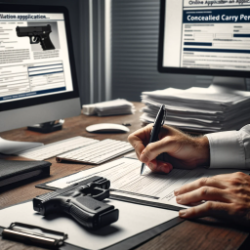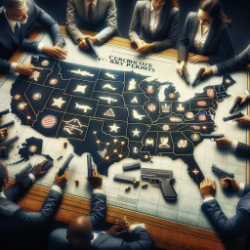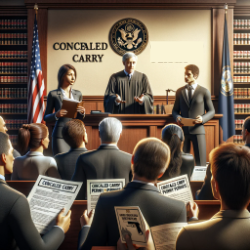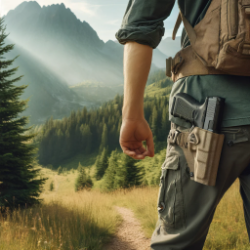
For those of us who enjoy outdoor activities like hunting, hiking, or simply immersing ourselves in nature's peace, knowing how to legally carry a concealed weapon is essential. The liberty to wander with a sense of security is something many of us cherish and consider fundamental. Whether you’re tracking deer at dawn, setting up camp in the wilderness, or safeguarding your property, a concealed carry weapon (CCW) can be an important tool for safety and peace of mind. Concealed Carry.
The aim of this guide is to make clear the complexities surrounding concealed carry permits. It gives a state-by-state overview, critical for understanding diverse and sometimes complicated regulations. Especially for those in the hunting community or anyone participating in outdoor activities where encounters with wildlife could present a threat, being prepared and compliant with the law is crucial. The regulations may vary as much as the landscapes we traverse, with some states having more lenient permit processes, while others, such as California, enforce stricter guidelines and requirements. concealed carry.

Moreover, this guide caters to a wide audience, from novice gun owners exploring their first permit to experienced marksmen seeking renewal or understanding of reciprocity laws across state lines. For the DIYers working on their property, to the adventurers exploring the rugged terrains of America’s parks and forests, understanding how to navigate the legal terrain of concealed carry is just as important as mastering the physical one. Concealed Carry.
As we embark on this guide, keep in mind that staying informed and compliant with the law enables you to enjoy your outdoor adventures with confidence and security. Whether you're an experienced hunter affiliated with the NRA or someone who enjoys occasional outdoor excursions, this guide offers the comprehensive overview you require. concealed carry.

A concealed carry permit enables individuals to legally carry a concealed firearm in public. Each state has its own regulations and requirements for issuing these permits, typically involving background checks, training courses, and an application process. Carrying a concealed weapon without one of these permits, where required, can lead to serious legal consequences. These permits are designed not only to ensure public safety but also to uphold the rights of responsible gun owners. As defenders of Second Amendment rights, we recognize the importance of these permits in allowing law-abiding citizens to protect themselves and their families, especially in uncertain times. It's also proof of the trust placed in citizens who promise to handle firearms with the utmost responsibility and respect for the laws that govern us. concealed carry.

Various states have varying regulations for obtaining a concealed carry permit. For example, Kentucky might have less stringent regulations compared to California, which has rigorous requirements and processes. Knowing the specific laws of your state is crucial for carrying a concealed weapon legally and responsibly. These variations often mirror the local culture and attitudes toward gun ownership and use. By way of illustration:
This difference requires individuals interested in obtaining a CCW to be well-informed about not only their state's laws but also the regulations of any state they intend to visit. The process can be straightforward or complex, depending on your location and experience with firearms, underscoring the importance for potential applicants to thoroughly research and prepare for the requirements they may face. concealed carry.

Renewing your CCW permit can sometimes present challenges comparable to obtaining one initially. Most states stipulate renewal every few years, often necessitating a refresher course or shooting qualification. It's imperative to consult your state’s official resources well in advance of your permit’s expiration to avoid potential legal issues. This diligence is essential because lapses in permit validity can inadvertently lead to legal repercussions, even for law-abiding citizens. Additionally, the renewal process frequently updates you on any changes in gun laws, ensuring ongoing compliance with current regulations. Many states also utilize the renewal process to reevaluate the holder's eligibility, including any criminal activities or mental health concerns that could impact their suitability to carry a concealed weapon. This continual vetting process underscores the commitment to safety and responsible gun ownership. concealed carry.

Reciprocity takes place when one state recognizes the concealed carry permits of another. Several states recognize California’s CCW, but not all. Before undertaking your journey, make sure to check the CCW reciprocity agreements between your home state and your destination to avoid any possible issues. It's essential for people who frequently cross state lines, whether for outdoor activities, competitions, or personal reasons. Below are a few key points regarding CCW reciprocity.

Understanding this is essential for ensuring compliance with various state laws and protecting that your rights are protected while away from home. Understanding and managing these complexities can ensure ensure that your travels are hassle-free. concealed carry.

Obtaining a CCW permit can be expensive and varies greatly depending on your location.These expenses might cover the application fee, training sessions, and occasionally extra charges for fingerprinting or background screenings.Ensure you account for these when planning to apply for or renew a CCW permit.In addition, certain states may require payment for the renewal process and any legal guidance needed to navigate the application process.It's also important to factor in the expenses for the necessary firearms and accessories, like holsters or safe storage options, crucial for safely carrying and maintaining a firearm.Budgeting for ongoing training can also be an important consideration, as staying proficient with your firearm is essential for both safety and compliance. concealed carry.

Applying for a CCW permit can involve either applying online or visiting a local sheriff’s office, with the process varying accordingly.Normally, it requires submitting an application, finishing mandatory training, passing a background check, and paying any applicable fees.Often, applicants are also required to provide fingerprints and undergo a personal interview to evaluate their motivations for seeking a CCW and their grasp of the associated responsibilities.This comprehensive approach ensures that only qualified individuals are granted the right to carry concealed.Those who are new to the process may benefit from consulting legal experts or experienced permit holders to efficiently navigate the complexities of state-specific requirements. concealed carry.

It's essential for those of us who head into the woods armed to understand the legal landscape.This includes not only state laws but also federal regulations that might affect where and how you can carry your concealed weapon.Being part of the NRA and a strong supporter of the Second Amendment, it’s crucial to stay informed about:
Navigating these legal waters can be as challenging as the physical terrain we explore.Keeping up with changes in laws and recent court rulings that could affect your rights and responsibilities is crucial for responsible gun ownership.By doing this, you guarantee not only your safety but also the safety of those around you, safeguarding the integrity of the sport and your rights. concealed carry.

Laws around concealed carry are subject to change.Keeping informed through resources such as the National Rifle Association (NRA) can assist in ensuring compliance with current laws and readiness for any potential changes.Changes in legislation can greatly affect how and where concealed weapons can be carried as political climates evolve and public opinions change.Below are some trends and potential future changes in concealed carry regulations that may impact gun owners:

By paying careful attention to these advancements, individuals can adjust to changes and still enjoy their entitlements under legal provisions. Getting involved in advocacy efforts and engaging with firearms rights organizations can also play a pivotal role in shaping the future of concealed carry regulations. Such proactive engagement ensures that the voices of responsible gun owners are heard in the legislative process, potentially influencing decisions that affect millions of Americans. concealed carry.

There are multiple resources available to assist in obtaining a CCW permit. State government websites typically offer the most direct assistance, while various firearm safety and training organizations also provide valuable guidance. Furthermore, many local gun shops and shooting ranges offer classes and can offer personalized advice based on their extensive experience with local regulations. They frequently have connections within the local licensing authorities and can provide insight into the nuances of the application process in your area. concealed carry.
If you seek more structured assistance, the National Rifle Association (NRA) offers resources such as comprehensive state-by-state guides to gun laws, legal defense insurance, and updates on legislative changes affecting gun owners. Other organizations, such as the United States Concealed Carry Association (USCCA), offer similar services alongside educational programs and legal assistance specifically tailored for CCW permit holders. Using these resources can significantly streamline the process of obtaining and renewing your permit, ensuring you stay informed and compliant with current laws. concealed carry.

To navigate the complexities of concealed carry permits, attention to detail and an understanding of constantly evolving laws are required. By staying informed and compliant, you can ensure your safety and enjoy your outdoor adventures without legal worries. Whether you're an experienced hunter or a casual weekend hiker, comprehending these laws is integral to being a responsible gun owner. concealed carry.
